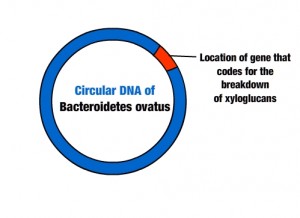It has been known for many years that humans consume a type of dietary fibre called xyloglucan; however, how it’s degraded in the human gut has always been unclear. A recent study published in Nature now indicates that xyloglucans (XyGs) are broken down by a specific type of bacteria that we have in our digestive system. Dr. Harry Brumer from the University of British Columbia collaborated with the University of Michigan and University of York to isolate the gene in the bacteria responsible for this process.
XyGs are found in the cell walls of fruits and vegetables such as lettuce, tomatoes, and eggplants. According to Dr. Brumer “it’s [been] known for many years that our gut bacteria could ferment [XyG] and turn it into short chained fatty acids which we can then uptake and get energy from.”
The following video outlines how bacteria help our body digest this specific type of dietary fibre:

Gene knockouts were performed to isolate the specific set of genes in the bacteria, Bacteroidetes Ovatus (B. ovatus), responsible for degrading XyGs. By doing this, they were able to see how taking out these specific genes would affect the growth of these bacteria. Dr. Brumer explains the importance of having B.ovatus in our g ut: “our own genome only encodes very few dietary enzymes that break down carbohydrates so that’s really the key thing about these gut bacteria.”
ut: “our own genome only encodes very few dietary enzymes that break down carbohydrates so that’s really the key thing about these gut bacteria.”
To further help him understand how this process works, three-dimensional computer models were built of the enzyme made by B.ovatus. This gave Dr. Brumer a visual understanding of how the degradation of XyGs occurs at the molecular level.
So how is this relevant to the general public? In the following podcast, Dr. Brumer explains the basics of his research on dietary fibre degradation and its importance for the average human being.
Audio clip: Adobe Flash Player (version 9 or above) is required to play this audio clip. Download the latest version here. You also need to have JavaScript enabled in your browser.
As Dr. Brumer explains, “we’ve existed for thousands of years not knowing anything about what’s going on in our gut but the more we know, the more we can positively impact that.” Dr. Brumer goes on to add that “if you go an antibiotic regiment, you actually damage the bacteria population in your gut. When you link that together with what we know about the capacity of these bacteria to break down complex carbohydrate, dietary fibre, you realize that well maybe you want to think a little but about balancing your antibiotic treatment.”
According to Dr. Brumer, “you are much better eating a vegetable rich diet.” Nevertheless, he does not “advocate [one to be a] complete vegetarian” either. “You need meat to provide protein and it can be challenging for people who are on a strictly vegetable based diet to get enough protein” in their body through alternative sources. Therefore, it is essential to keep a balance between both.
In summary, we harbour a symbiotic relationship with the bacteria in our gut. So keep your gut bacteria happy and they will keep you healthy!
Blog post by Ramen Kaur Sandhar, Sean Liu, and Sam MacKinnon
Image by Sam MacKinnon
